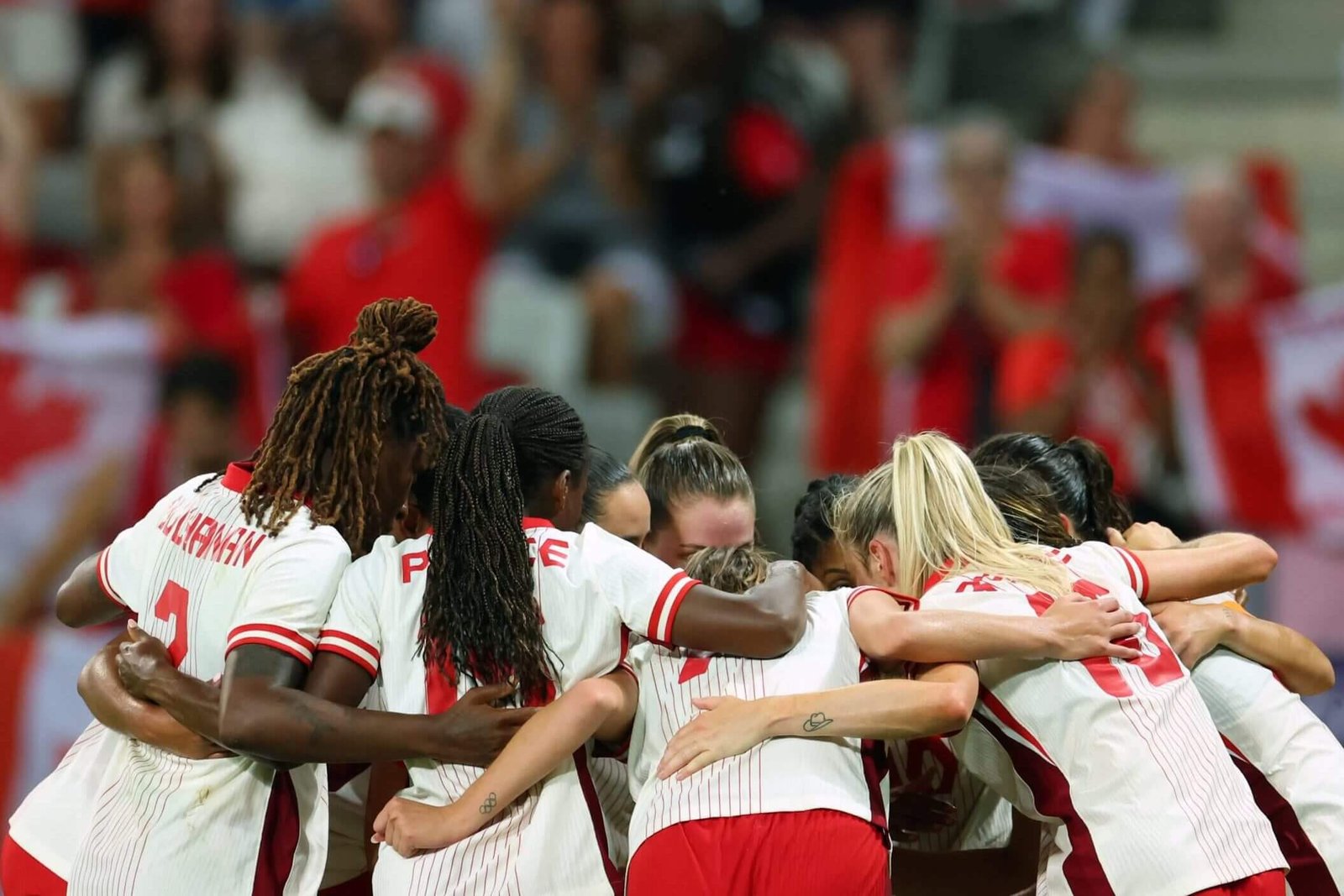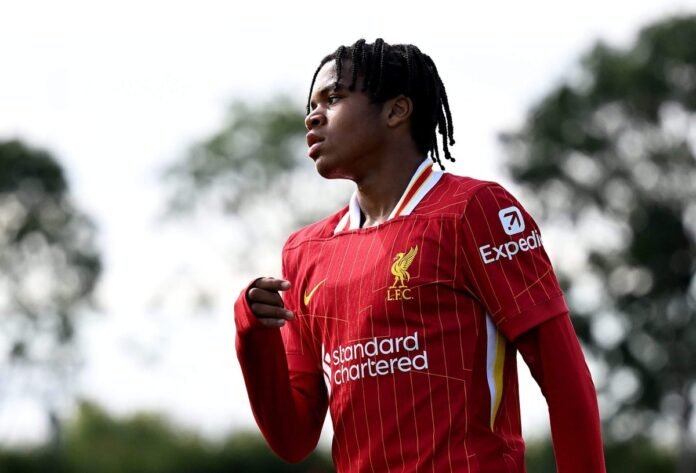The Athletic FC is The Athletic’s daily football (or soccer, if you prefer) newsletter. Sign up to receive it directly to your inbox.
There’s panic on the streets of the Premier League’s academies. But they’re fighting back.
Academy antics
(Getty Images; design: Dan Goldfarb)
Scouts honour
Victor Orta, Leeds United’s former director of football, will tell you about his earliest trips to the South American Under-20 Championship and the small gaggle of scouts who gathered there with him.
Then he’ll tell you about his subsequent trips and the hundreds of recruitment staff who swarmed all over the tournament, jostling for seats, reporting home, all of them in on the act.
There was a time when transfer secrets existed in football, but not any more, and most certainly not in Premier League circles. Clubs there crawl across the academy circuit like locusts. Every prospect is tapped and if they aren’t on your radar, the people in the field need the riot act read.
The intensive farming has two consequences. The first is that youth-team matches across England are awash with rival eyes and ears. The second is that clubs in possession of hot talent go to greater and greater lengths to protect it. It’s the theme of this excellent feature by The Athletic — an article spawned by rising tension on the academy scouting front.
Tricks of the trade
The poaching of quality young footballers (and the squabbles caused by it) is nothing new. In the 2006-07 season, I covered a saga that was almost the start of the genre: Leeds accusing Chelsea of breaking rules by signing two teenagers from them and Chelsea settling the dispute by paying £5m ($6.4m).
You can read an interview with one of those players, Tom Taiwo, here.
Trading at junior level is relentless and frenetic. Only this season, we have two prime examples: Manchester United taking Chido Obi-Martin (see him scoring the first of his 15-minute debut hat-trick, above) from Arsenal and Liverpool signing Rio Ngumoha from Chelsea, both of them 16 and very highly rated. Arsenal and Chelsea didn’t want to lose them, but that’s the way the water flowed.
Various people in the industry told The Athletic that Brexit — the UK’s departure from the European Union in 2016 — had turned the dial on academy recruitment further. English teams can no longer bring in players from abroad until they turn 18 (by which time, the best are pricey). Moreover, fees raised by selling academy talent is a proven way of meeting Premier League profit and sustainability rules (PSR).
As one of the scouts we spoke to said: “The market is mad at the moment. Compensation isn’t much of a barrier. It’s leading to complete opportunism.”
Controlling the herd
This topic blew up a few weeks back when it was revealed that conduct at youth-team games had prompted some Premier League teams to ban opposition scouts from their training grounds. Premier League rules require scouting staff to be given access provided they apply in time.
So what tricks are being used to keep the recruitment crowd in check?
Scouts are often herded into specific areas at matches, sometimes with a deliberately poor view of the fixture they’re trying to watch.
Keeping them penned in prevents them from approaching or courting players’ parents.
Teamsheets are withheld, hindering the identification of targets.
“They’re treated like lepers at most places,” is how one club employee put it.
The friction, we’re told, is “getting worse and worse” and you can well believe it. The big deals teams pull off in each window are what the wider world focuses on, but under the surface, it’s the same game of dog-eat-dog. The appetite for youth-team signings is vast and it isn’t about to drop off.
News round-up

(Getty Images; design: Meech Robinson)
- An investigation by The Athletic has found Sheffield United were warned about alleged “bully-like behaviours” by women’s manager Jonathan Morgan a few months before their former player, Maddy Cusack, took her own life in 2023. Morgan has denied contributing to Maddy’s anguish. Daniel Taylor reports.
- An intriguing line from Spain, broken by David Ornstein: Real Sociedad sporting director Roberto Olabe will leave his post when this season ends, ahead of time, too. Don’t Arsenal have an Edu-sized hole to fill?
- England’s Football Association is following the PGMOL in launching an investigation into videos of Premier League referee David Coote in which he appears to insult Liverpool and the club’s ex-manager, Jurgen Klopp.
- A Premier League player accused of rape was interviewed again by police last week, having first been arrested in 2022. For legal reasons, we cannot name him.
- Turkish side MKE Ankaragucu mounted a staunch defence of president Faruk Koca after he was sentenced to three years in prison for punching a match official. They say he is the “target of one-sided public perception”, whatever that means.
- Claudio Ranieri is considering coming out of retirement to take the perennially vacant head coach’s job at Roma. He called it a day at the end of last season. Roma don’t appear to have much of a grand plan.
Most clicked in yesterday’s TAFC: the day Lionel Messi played West Ham United’s Under-21s. We’re talking about Messi fatigue in MLS on The Athletic FC podcast.
Canada ‘Spygate’ report

(Marc Atkins/Getty Images)
What does it tell us? What does it not tell us?
Canada’s women’s team at the 2024 Olympic Games was, in the politest terms, an utter debacle. Claims they used drones to spy on New Zealand saw head coach Bev Priestman sent home and a six-point penalty imposed on their group-stage total.
Some defence of their gold medal in Tokyo.
An independent investigation into the surveillance scandal and the culture of Canada’s national teams has now published its findings. Be warned, the answers provided only prompt more questions.
The big headline first: Priestman, who is serving a one-year FIFA ban for her part in the Paris mess, is out. Already suspended, she won’t be returning to her role. The same goes for assistant Jasmine Mander and analyst Joseph Lombardi, both of whom were also implicated.
The investigation found Canada used drones to obtain footage of opposition training sessions at the Olympics, but had not shown it to their players. It was “a symptom of a past pattern of an unacceptable culture”, according to Canada Soccer CEO Kevin Blue.
But in some respects, the findings are unsatisfactory. Canada Soccer hasn’t released the whole report, merely a summary, in which details are redacted. The investigators failed to interview former Canada men’s and women’s coach John Herdman (now in charge at Toronto FC) over any part he played in encouraging spying because “the parties were not able to reach a mutually agreed time to meet”.
Canada Soccer has launched a disciplinary process against Herdman for potential violations of its code of conduct and it remains to be seen where that goes, but in no way has its review fully nipped the matter in the bud.
Back in my Ddy
#OnThisDay 12 years ago, Scholesy scored this stunner against Villa.
Describe it with an emoji — we’ll start: 🚀 pic.twitter.com/ye0ykcLcTC
— Manchester United (@ManUtd) December 23, 2018
Have you ever had the pleasure of Match of the Day’s goal-of-the-month competition from December 2006? Go on, fill your boots. You’ll find filth from start to finish. Nobody was touching Manchester United’s Paul Scholes (above).
World-class strikes haven’t died out, but the gun-slinging in 2006 is wonderfully raw: all of the finishes wild and outlandish and smashed with full force. These days, football has so much more finesse.
This is not necessarily a compliment. Oli Kay has been comparing the current Premier League with the early 2000s era, a period we affectionately call the ‘Barclays’ (because the division was sponsored by Barclays bank). Was it better as a spectacle back then? Was it worse? It was less refined, that’s for sure. And I pine for those days slightly.
‘King Kazu’ extends reign

(Gualter Fatia/Getty Images)
Prepare to feel inadequate.
There’s a footballer in Japan, Kazuyoshi Miura, who has just confirmed he’s ready to face his next professional season. No joke — it’s his 40th. He’ll be 58 when it kicks off in March.
Miura goes by the nickname ‘King Kazu’ and if the cap fits, wear it. His career began in Brazil in 1986. It’s not even as if he’s playing walking football now. His team in Japan, Atletico Suzuka, are in the country’s fourth tier. He’s on loan from Yokohama in the second division. The guy is indestructible.
Several years ago, The Athletic’s Daniel Taylor went to meet him. Miura tells people he wants to “die on the pitch” and he’s probably only half joking. His devotion knows no bounds.
Coaching style

(Denis Doyle/Getty Images)
Our data writers, Thom Harris and Anantaajith Raghuraman, were put to work answering questions for The Athletic’s readers about the mystical world of football tactics and numbers.
You’ll learn loads from their musings, but these bits of their analysis stood out to me:
- Number one? I’m totally unfamiliar with Claudio Giraldez, who replaced Rafa Benitez as Celta Vigo’s boss in La Liga last season, but he wears some smart threads (see above) and his 3-4-3 system sounds like a blast. Crystal Palace would kill for their attacking threat.

- Number two. Palace should sound the alarm. They’re bottom three in the Premier League, they don’t score goals and, statistically, they’ve got the worst run of games to the turn of the year (see above). In case of emergency, break Oliver Glasner.
And finally…
GENOA CFC x UNDERTAKER
⚫️🍯 pic.twitter.com/SP11CuRKF5
— Genoa CFC (@GenoaCFC) November 12, 2024
Coming to a Serie A ground near you soon: The Undertaker’s WWE tombstone.
Well, not exactly, but the man himself showed up yesterday as the face of the launch of Genoa’s third kit (replacing singer Rita Ora, who did the honours last year). Those black shirts will fly out the door.
Ignore the PR drivel, which described The Undertaker as being “in the Olympus of ring legends in a beloved and transgenerational sport” (translation: he’s a top wrestler). As mash-ups go, this is pretty cool.
(Nick Taylor/Liverpool FC/Liverpool FC via Getty Images)
Read the full article here


